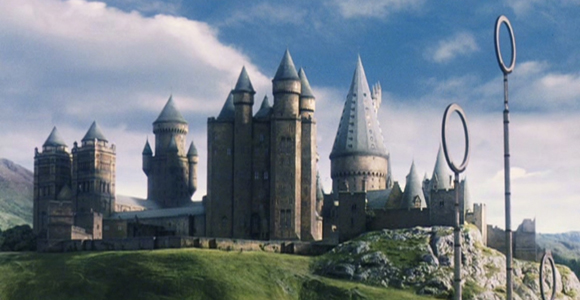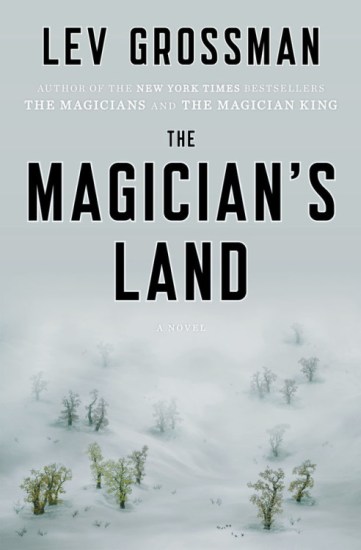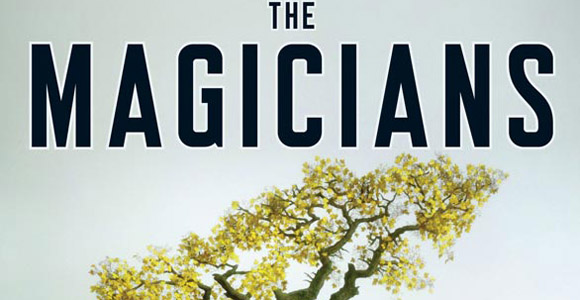Lev Grossman’s The Magicians and the Mainstreaming of Fan Culture
This is just like magic!

A few weeks ago, the Syfy network announced their plans to adapt Lev Grossman’s fantasy trilogy, The Magicians, into an hourlong drama series. The small handful of blogs and online news outlets who covered the story labelled the project “Harry Potter for adults,” or else slapped it with a somewhat derisive-sounding “Young Adult fantasy” label. On the surface, it’s easy to see how people can mistake The Magicians for any number of other “young people discovering they’re mystically special” narrative, but it’s a description that is, nevertheless, inaccurate.
Now I’m not crazy. I know a story about a group of young adults who attend a magic school and then go traipsing around an alternate universe which can be accessed via an interstitial forest sounds a lot like “Harry Potter/Narnia for adults.” But what that description betrays is a failure to understand that Grossman’s series isn’t a rip-off of either story, but is instead something newer and stranger than that.
I’d argue the books are better described as a fanfiction composed of nothing but Mary Sues and Gary Stus. Where the Gary Stu narrative would feature the author’s fictional surrogate gatecrashing Hogwarts, making out with Hermione and winning the Quidditch cup, Grossman instead constructs The Magicians as a wish fulfillment theme park for his lead character, Quentin Coldwater, with two main attractions: Brakebills and Fillory.

Brakebills is the Hogwarts stand-in, located in upstate New York (with a satellite campus/testing center in Antarctica). The main difference between Hogwarts and Brakebills is that Brakebills doesn’t just let any old magically-inclined student through its doors. Instead, you’re invited for an entrance exam which, if you pass, grants you admission into Magic U. If you fail, your memory is wiped and you get to continue your sad, magic-free life. This distinction leads to drama down the road, but also helps to position Brakebills as elite rather than just a local catchment district for any and all magic-prone youths. This elite distinction also has the side-effect of making Brakebills students insufferably arrogant, like the worst kind of grad students imaginable.
Fillory, meanwhile, is unabashedly a Narnia clone. We’re told Quentin was a big fan of the book series as a kid and is delighted and horrified to learn it’s a real place. Delighted in that he gets to visit a world he’d spent hours imagining as a child, horrified when he discovers the rather stark differences between fiction and reality.
This is where Grossman’s novels can be set apart from other Young Adult fantasy stories: Quentin and his friends aren’t the kind of characters who’ve been raised in an alternate universe away from modern popular culture. They’re not only aware of Harry Potter (sly comments about wizard’s chess and magic wands are thrown around now and then), but they’re established as being full-out pop culture junkies. The author and his characters drop references that run the gamut from The Godfather to Young Frankenstein roughly five times a page. This means the heart of Grossman’s story is its examination of fan culture by posing the question, “What if it was all real?”
Grossman’s answer is, first and foremost, that it wouldn’t be anywhere near as rosy as you’d hope. Would you want to go to Narnia if it turned out to be far more dangerous and corrupt than advertised? Would the allure of Hogwarts rub off if your classmates were a group of arrogant, navel-gazing grad students? I didn’t love Grossman’s first two books (the third and final novel, The Magicians Land, is set for release on August 5th), but as someone who has fallen down one too many fandom rabbit holes, I understood and appreciated the novelty of his intent.

The trouble is that people who have never been part of a “fandom” (and I have to assume that label applies to most people) tend to greet fans and fandom culture like it’s a side show attraction. Take the number of times that British late night talk show host Graham Norton has waved dirty fan art and fan fiction in the faces of Tumblr favorites like Benedict Cumberbatch or Martin Freeman to a cringing audience. The implication is clear: who would spend so much time writing R-rated stories about fictional characters? And in many ways, though The Magicians isn’t strictly fanfiction, it does stem from that same urge to “dirty up” your favorite shows or movies or books — it’s Hogwarts After Dark and Narnia without the glossy sheen of childhood innocence. So naturally, it appeals to the same audience.
Because of the divide between “normals” and “fans,” I have a hard time picturing this series as a successful TV show in the long run, much less something that survives pilot season. Grossman isn’t asking casual readers what they’d think of being able to go to Hogwarts, he’s asking that question of people who spend entirely too much time fantasizing about and inhabiting those worlds on a regular basis already.
It’s possible I’m wrong, and if I am wrong, there are two likely avenues I could see this show succeeding with: Either it follows the books’ lead of appealing to fanboys and -girls who might make the show a cult hit, or else the show runners may downplay the fandom-y elements of the story to appeal to a wider audience. In the first instance, you shut out the average viewer. In the second, you wind up with a project which does indeed come off more as a rip-off than its own story.
In short, I’m not optimistic. Mainly because I think the mainstreaming of fan culture is still in its infancy even if nerd culture is still in vogue. Take a show like The Guild and compare it to The Big Bang Theory: one is a web series with a tiny budget, the other is the biggest comedy on TV. But where The Guild takes a realistic look at the lives of a group of World of Warcraft gamers, The Big Bang Theory offers up a cast of one-dimensional nerds who drop Star Wars jokes. Ultimately, it’s one thing for a show to offer up pop culture references to garner easy laughs, but it’s quite another to ask the audience to invest in and understand the nuances of a particular subculture. Until we reach a point where people find it easier to identify with nerds, rather than laugh at them, The Magicians won’t work.
—
Sarah Arboleda lives with a human and two cats in British Columbia, Canada and writes for a number of blogs including her own — the pop culture-based Tea Leaves and Dog Ears. If you’d like to yell at her, feel free to do so over Twitter.
Are you following The Mary Sue on Twitter, Facebook, Tumblr, Pinterest, & Google +?
Have a tip we should know? [email protected]
